- Home
- Michelle Tea
Girl at the Bottom of the Sea
Girl at the Bottom of the Sea Read online
www.mcsweeneys.net
Copyright © 2014 Michelle Tea
Cover and interior illustrations by Amanda Verwey.
All rights reserved, including the right of reproduction in whole or in part, in any form.
McSweeney’s McMullens publishes great new books—and new editions of out-of-print classics—for individuals and families of all kinds.
McSweeney’s is a privately held company with wildly fluctuating resources.
McSweeney’s McMullens and colophon are copyright © 2012 McSweeney’s & McMullens.
ISBN: 978-1-940450-68-1
To Chloe Lark.
Contents
Chapter 1
Chapter 2
Chapter 3
Chapter 4
Chapter 5
Chapter 6
Chapter 7
Chapter 8
Chapter 9
Chapter 10
Chapter 11
Chapter 12
Chapter 13
Chapter 14
Chapter 15
Chapter 16
Chapter 17
Chapter 18
Chapter 19
Chapter 20
Chapter 21
Acknowledgments
About the Author
About the Illustrator
Chapter 1
It’s like a fist, Sophie thought. A giant fist the color of water, which is the color of nothing, but gray-blue like the cloudy sky and black from the oil and grease of the creek. Being water the great wave shone, catching a sliver of fiery orange from the last bit of sun in the sky. It was a terrible, liquid fist edged in burning colors, a shimmering, wet fireball smelling like the salt of the sea and the dirt of it, too.
Beneath the waters of the shallow creek, her face buried in Syrena’s long hair, Sophie struggled. Syrena clutched her tighter, her strength surprising, magic and animal. But Sophie was not trying to escape, she only wanted to see. If she was going to die at the ocean hand of her grandmother, Sophie wanted to do it bravely.
Twisting her face free, she tilted it upward through the water, toward its grainy surface. Above her, the shadow of the great wave darkened the creek and Sophie could hear, muffled by the water and by her terror, shouts and screams from the shore. Angel. Dr. Chen. They would be running now, pushing through the torn links that fenced the creek, booking it for higher ground. A tsunami in Chelsea Creek. The rogue wave had reached its maximum height. All through the city, people would blink, rub their eyes, and shake their heads. Something tall and shining in the darkness—was it a cloud? It was nothing. It was gone as soon as they saw it. But the sound of it! The flooding on the banks!
When Kishka’s mighty fist came down, Sophie felt herself fall to pieces. Though the pain was too great to fully comprehend, it was as if her body had become liquid inside and her bones and muscles were being ground into the trash and silt beneath her feet. She felt the mermaid torn away from her, thrown up into the sky. And before she could cry out, Sophie was flying, too. As hard as she had been punched down into the creek bed, so did the force of the wave catapult her into the air.
By the last light of the sky and the faraway streetlamps ringing the housing projects, Sophie and the very creek took flight. A shopping cart whizzed by, a car door, a small refrigerator. Like a girl in a horrible snow globe, she was suspended in a confetti of creek mud, stuck here and there with rocks, with bits of brick and chunks of cement. From her vantage she could see across all of Chelsea—the old-fashioned dome of City Hall, the red-and-white-checked water tower at the top of Soldier’s Home, the Tobin Bridge like a length of green Legos, stretching into Boston, and even Boston itself, with its glittering buildings. And all around it, water.
Time seemed to slow as Sophie flew above the city and she looked down upon it. How small Chelsea looked, how tender it suddenly seemed, with its twinkling streetlights, the yellowy glow coming through the windows while inside families ate dinner, oblivious. Even the groups of boys gathered in the city square, the ones who had so often yelled after Sophie and forced her to take a different route home, seemed innocent to her now for all they didn’t know. They thought that Chelsea was simply a city, a banged-up urban playground that held and trapped them. They had no idea that it was so much more—the birthplace for an ancient magic that had suddenly and powerfully awoken, a magic that was inside Sophie, that threaded through her family, coming down from her ancient and terrible grandmother who seemed to have become the poisoned creek itself and was now sending her granddaughter so many miles above the town that it looked like a child’s toy beneath her, its graffitied walls and trash-strewn curbs no longer visible.
But at Sophie’s wild height, with time slowing down around her as she tumbled from the sky, with all that she had learned racing through her head, Sophie saw only home. What a strange way to leave home for the first time, she thought as she flew. Her heart rang out for this town that had bugged her so hard, its packs of boys that menaced her, its dirty creek and beat-up parks. It’s mine, she thought. Mine to protect and return to. Mine to save—from my grandmother.
At that thought, the wave that had lifted Sophie so violently into the air shattered around her like glass, and in every drip and drop, every splash, were the many faces of Kishka: Kishka the dragon, Kishka the grandmother. Kishka the young beauty and Kishka the swirling darkness, the very fabric of terror, the power that every act of evil draws its energy from. Kishka the Odmieńce—one of the last of these magical beings that walked the earth at the beginning of time, that had shaped the earth, the people and their ways. Kishka had shaped the world in the most terrible of ways, bringing war and pain and hatred. Kishka had been living off humanity’s misery since the dawn of time; she’d grown rich with it, parked in a garbage dump in Chelsea, Massachusetts, passing her days as a cranky old woman. But now Kishka’s secret was out. Sophie knew what her grandmother really was, and she knew that her own magic, whatever it may be, came from her. And now Sophie, with her little chunk of inherited magic, was going to have to face off with her grandmother, who had it all, whose magic was millennia-old.
And then there was Syrena.
The mermaid was flying through the night sky alongside her, a miracle of the air now, not the sea. For a moment Sophie forgot her own self—broken, hurled, imperiled—and was mesmerized by the sight of the creature, her first clear view. Her tail was so long! Thick and strong, it beat against the air as if Syrena was trying to swim through the sky. Her scales in places glinted like rhinestones, and in others they were dull, torn up, trailing ragged tendrils. Her long, pale arms looked made from the moon that glowed in the sky, and they scratched and flailed at the darkness. Her hair streamed out behind her, longer even than her tail, impossible. It looked like a great mat of seaweed, its own ecosystem, stuck with seashells and tiny sea creatures and woven through with slick green sea plants. At the mermaid’s hips were strange, winglike fins; like a jellyfish they undulated. Syrena curled her body through the air, but she was not a bird, she was a sea creature. And as Sophie felt herself begin to plummet, so too did the mermaid.
Syrena flipped herself in the air like a wild acrobat. “Like me!” she screamed to Sophie, the rush of the fall ripping the words from her mouth, but Sophie caught them. Syrena had tumbled her body into a dive and stretched her arms before her. Her head was tucked, her hair tangled around her face like a mask. Even if Sophie wasn’t so broken, she doubted she’d be able to do as Syrena showed her. Clumsy Sophie, who’d kicked her gymnastics teacher in the chin during her first (and last) class. Sophie, probably the only person on earth not to have a center of gravity. Sophie who wobbled and tripped even when her shoelaces were tied; Sophie would not have been abl
e to flip her body into the arrow that Syrena had become, cleaving the water, sending up a great spray. No. Even if she could have moved, Sophie would have entered the water the same way: in a terrible back flop that would have turned her bones to jelly—if she still had bones. But Sophie didn’t think she had bones anymore. She was a beanbag, a water balloon. She hit the water with a tremendous impact, and then she sank into the darkness.
Chapter 2
Some time later, Sophie awoke under the water. The talisman she wore around her neck softly illuminated the rippling area closest to her. Even the watery fist of her grandmother—as big, it seemed, as the ocean itself—had not been enough to rip the sea glass from her neck. It was strong, just like Angel, who had given it to her. Unable to move, Sophie thought of Angel hard at work in Kishka’s dump, working the glass tumbler with thick, dirty gloves on her hands, hoisting barrels of sparkling color onto her shoulders, her brow sweating beneath the band of the woolly cap she wore no matter the weather. Sophie wished she could reach out to her friend’s mind to let her know she was okay, but then, Sophie wasn’t sure she was okay. But if she was going to be okay she knew that the talisman would help her, and she thanked Angel in her heart as she lay inside its cool, blue glow.
The light attracted a small school of curious fish. They were nothing more than slivers, silvery and translucent. As one they darted toward the glow, and as one they quickly twitched away. If Sophie had been able to move she could have reached out and touched them. Instead, she just watched their movements, all as one, as if conducted by a giant fish just out of sight, holding a baton. The brave ones at the front of the school put their tiny fish mouths right onto the glass and ate the small bits of effluvia that had settled there. She wished she could communicate with them as she had with the pigeons of Chelsea, that she could expect a new group of English-speaking animals to join up with her wherever she went, helping her out like she was some urban Snow White. But Sophie knew the pigeons were special, with their sweetness and their fierceness, and how her heart ached for them as she lay there at the bottom of the bay. What Sophie would have given to listen to Arthur rage against Kishka then, at her terrible powers, at how she had made the creek come alive and turn against them all. Arthur would have some choice words for her grandmother, delivered in his husky squawk with much flapping of feathers. But as quickly as a tiny smile came to her lips, Sophie realized that Arthur’s beloved Livia was gone—gone from all of them, forever. It probably wasn’t spite Arthur was feeling right now. It was probably something much more heartbreaking.
Sophie sighed, a jellyfish-sized air bubble that shimmered up and away. She watched it travel, losing sight of it before it reached the surface. She could tell that she was deep, but not terribly so. In fact, she realized, it was the noise of what sounded like a party boat that had roused her. The dull thump of bad music and the shrill chorus of people yelling, hollering because the music was too loud or they were too drunk or both. Booze cruises, her mother called them. Sophie had seen them twinkling by on summer nights when she and her mom drove out to where the harbor sloshed up against Chelsea. To Sophie, they looked like toys; they looked fun. Her mother had dismissed them. “Just a bunch of drunk people,” Andrea had said. “They pay a lot of money to get seasick and puke off the side of a boat.” Sophie had made a gross joke about the harbor being filled with vomit, and Andrea indulged her with a laugh. The tinny sounds of a Madonna song wafted over them, gentle as the waves.
It had been a sweet moment, but now it made Sophie feel sad. Andrea probably would have loved to have gone on a booze cruise. She worked hard, with barely a day off. Days she didn’t work she either ran errands for hours or conked out in front of the television, exhausted. Or both. Sophie didn’t think she’d ever seen her mother get dressed up, flick a fan of frosty eye shadow above her eyes, and go dancing. She figured her mom probably wanted to so badly she’d made herself hate it. When I’m done with saving humanity, I am going to make my mom go on a booze cruise, Sophie vowed. She thought Ella would probably love such a thing too, and promised that when she reconnected with her best friend she wouldn’t be such a nerd. She’d let Ella put makeup on her like she was one of those giant Barbie heads little girls smear fake lipstick onto. She’d let Ella do something with her head of snarls—even just detangling it would make Ella so happy. She’d ask her friend if she could borrow a pair of her jeans, one of her strappy tops, a pair of platform flip-flops. She’d suggest they go dancing at one of the awful underage dance clubs Ella always wanted to go to. They sounded horrible to Sophie—cheesy music, dumb boys with gelled hair trying to rub their hips on you on the dance floor, blinking lights making it hard to see, hard to focus—but for Ella she would do it. Sophie swore that if she got better and got out of the bay and back to Chelsea she would be a better friend.
If she got better, if she got back? Sophie’s own thoughts sent a chill through her spine—or where her spine once was. Things had gotten so crazy, science-fiction crazy, action-movie crazy, that she really didn’t know what was going to happen, just that somehow she was going to make it all better. She, the girl with the broken bones at the bottom of the bay, too scared to go to a teen dance club with her best friend: she was going to save the world from her grandmother’s ancient evil.
At this thought, Sophie began to cry a little, tiny tears that squeezed out the sides of her eyes and became lost in the bay. She was such a baby. But she suddenly didn’t care. She’d give anything to be back at home, huddled on the couch watching a dumb reality show beside her snoozing, overworked mom. If that made her a baby she didn’t care. She wanted it so badly she could practically taste it, and it tasted like a bowl of cereal for dinner, milky and sweet.
She thought of sweet Hennie, her magical aunt. Hennie, working every day at the creepy old grocery store down the street, the store Sophie had avoided for so many years. She could have known Hennie for so much longer, could have learned so much magic from her! But Sophie had had no idea, and like everyone else she’d been scared of Hennie, Hennie who looked like a witch with her wild gray hair and craggy face. She wondered where Hennie was now, and what had happened to Laurie LeClair, the girl with the worst reputation in all of Chelsea. She had come into Hennie’s grocery store possessed by the Dola, that destiny-policing creature, but when Sophie had left she was just herself, Laurie, cranky and messed-up and confused about where she was, with her screaming, neglected baby screaming and neglected by her side. Too much had happened, and look where it had left Sophie: lumped in the Boston Harbor, useless, cut off from everything and everyone. Not even in pain. That was what really scared her. She was too badly beaten by the fist of the creek not to be feeling any pain.
The coming and going of the school of silvery fish eventually lulled Sophie back into a sort of sleep; like a hypnotic pendulum, they danced back and forth around her necklace, and her eyes grew heavy. She imagined the flash of them leaping over the moon, full tonight, its bright beam cutting the water dimly. What would become of her? She was like a patch of weeds at the water’s bottom, alive but immobile. Could she even speak? She tried. “Help,” she spoke into the water. She repeated herself, louder. “Help.” And louder again, “Help!” The fish startled away at the sound, moving as one, a silver cloud. Sophie closed her eyes. And when she opened them again, the mermaid was there.
Chapter 3
Of course Syrena would not approach gently. Pushed toward Sophie by the underwater waves of a too-close boat, the mermaid shook her fist and yelled curses in a language too ancient for Sophie to understand. Propelled by her powerful tail, Syrena came straight for Sophie, pulling the girl into her arms in one fluid scoop. Nestled in the mermaid’s arms like a baby, Sophie noticed that all around them were those tiny fish, that they were suspended in a whirling ball of them. Together they moved with the girl and the mermaid through the waters.
“We must get out of here,” Syrena said. “This harbor is terrible. So many boats, they push you around like bullies! We nee
d deep water. You are very hurt.”
“I can’t move,” Sophie managed to say.
“I know. Don’t talk about it. You are, what is word—destroyed? If you had no magic you would be a dead girl. Is only magic keeping you alive right now. I must get you into deep ocean, for healing.”
* * *
UNDER THE MERMAID’S arm, both of them held inside the shimmering school—Like an underwater disco ball, Sophie thought, dazzled by the swirl of tiny fish—Sophie was carried beneath the harbor. The currents of boats shoved them this way and that, it was like trying to cross a busy street, like running across the parkway where four lanes of traffic whizzed by. The school of fish slowed as a boat passed close, containing them in its wake. All the while Syrena grumbled and cursed the ships, until finally they had crossed from the harbor into the open waters of the Atlantic Ocean.
Finally safe from the party boats that crisscrossed the harbor, Syrena paused, letting Sophie to the ground gently. The disco ball of fish cracked open, releasing them, then hovered close by, a landscape of shining silver. Sophie noticed in all the commotion that she had lost her shoes. Her feet glowed pale and blue beneath the water.
“We have long way to go,” the mermaid spoke. “And we swim against the current. I will need all my power, my tail and my arms. So, I will make for you a cocoon. From this.” With her luminescent arms the mermaid gathered her hair and shook it wetly at Sophie. Like a sea plant it drifted in the water, swaying in the waves.
The mermaid slid into the heavy sand where Sophie lay like a broken doll, a marionette with cut strings. Never had she been so helpless, splayed on the seafloor like a jellyfish. No, not a jellyfish, she thought, watching the globe of a jellyfish pulse by. Jellyfish could move—their glowing balloon bodies were nothing but movement. Sophie was just a bag of bones. Syrena dug into the sand beneath her, and with her strong, flat tail she pushed the girl up the length of her body until Sophie was stretched out on the creature’s back.

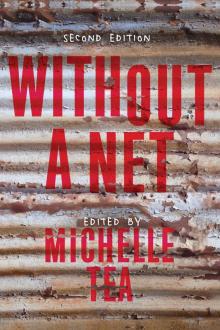 Without a Net
Without a Net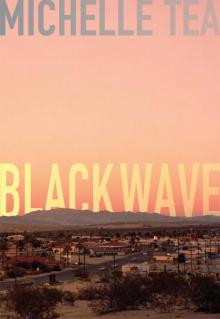 Black Wave
Black Wave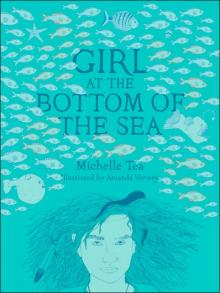 Girl at the Bottom of the Sea
Girl at the Bottom of the Sea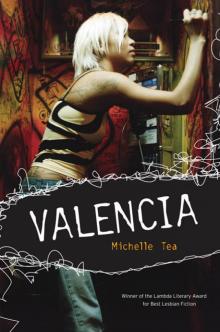 Valencia
Valencia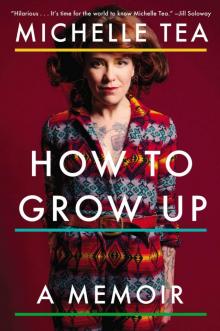 How to Grow Up
How to Grow Up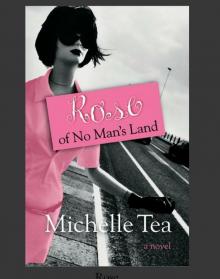 Rose of No Man's Land
Rose of No Man's Land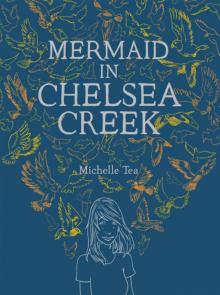 Mermaid in Chelsea Creek
Mermaid in Chelsea Creek